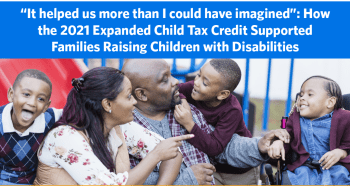To inform the Data Science for Social Impact initiative, SPI hosted a series of public roundtable discussions in partnership with the Mastercard Center for Inclusive Growth, data.org, and the St. Louis Regional Data Alliance in 2021. This report documents the information gathered at the first two discussions.
Category: *Research Report
Timely and Well-Targeted Financial Assistance during Covid-19
The Social Policy Institute (SPI) at Washington University in St. Louis partnered with PerkUp Financial Health LLC, a financial services technology company, to study an emergency financial assistance program offered to employees of three hotels in New Orleans, LA who have been affected by the COVID-19 pandemic. PerkUp serves as a technology hub for a […]
State-by-state: How are families in the U.S. using their Child Tax Credit payments?
The temporary expansion of the Child Tax Credit (CTC) is projected to cut American child poverty by more than half. The CTC expansion provides families with $3,600 for every child in the household under the age of six and $3,000 for every child between the ages of six and 17. The vast majority of U.S. […]
How are families in the U.S. using their Child Tax Credit payments? A 50 state analysis
The temporary expansion of the Child Tax Credit (CTC) is projected to cut American child poverty by more than half. The CTC expansion provides families with $3,600 for every child in the household under the age of six and $3,000 for every child between the ages of six and 17. The vast majority of U.S. […]
Employment, Financial and Well-being Effects of the 2021 Expanded Child Tax Credit: Wave 1 Executive Summary
The 2021 temporary expansion of the Child Tax Credit (CTC) is unprecedented in its reach and is predicted to cut American child poverty by more than half. The expanded CTC provides families with $3,600 for every child in the household under the age of six and $3,000 for every child between the ages of six […]
Policy & Practice Strategies for Inclusive Growth in St. Louis

A 6-part event series, Inclusive Growth in St. Louis investigated who is left out of St. Louis’ economic growth benefits, the policies that have led to the unequal distribution of opportunities, and actionable recommendations to become a more inclusive economy. This report summarizes those discussions and recommendations.
The impacts of the 2021 expanded Child Tax Credit on family employment, nutrition, and financial well-being

The 2021 temporary expansion of the child tax credit (CTC) was unprecedented in its reach, lifting 3.7 million children out of poverty as of December 2021. It provided families with up to $3,600 for every child in the household under the age of six and up to $3,000 for every child between the ages of […]
Expanded Child Tax Credit payments have not reduced employment
Approximately 60 million American children living in 35 million households received monthly payments from the federal government as part of the temporary Child Tax Credit (CTC) expansion. Discourse over whether or not the expanded CTC caused parents to leave the workforce emerged during the period of the expanded credit. On one side, a large number […]
“It helped us more than I could have imagined”: How the 2021 Expanded Child Tax Credit Supported Families Raising Children with Disabilities

Summary The 2021 expanded Child Tax Credit (CTC) provided temporary enhancements to the existing CTC for the tax years 2021 and 2022. Under the expanded credit, families with children under the age of 18 were eligible to receive a credit of up to $3,000 per child ($3,600 for children under the age of 6). In […]
Revealing Barriers to Cyber-Protection Among Small and Medium Businesses

Introduction Small and medium businesses (SMBs) contribute significantly to the global economy. According to the World Bank, SMBs represent 90% of businesses and more than 50% of employment worldwide. In addition, SMB ownership helps facilitate upward social mobility by building wealth and assets. However, even though the financial gain of owning a business is high, […]
People Do Save Some of Their Tax Refund, but Could Be Saving More (Links to an external site)
The Impact of Gig-Economy on Financial Hardship among Low-Income Families” Kaitlin Daniels, Olin Business School at Washington University
As the gig economy plays an increasingly important role in the labor market, there is a need to understand the economic factors that influence participation in this sector. In this paper, we investigate how saving the federal tax refund affects gig economy participation for low-income online tax filers in the six months following tax filing. […]
When a job is not enough: Employee financial wellness and the role of philanthropy
Employee financial wellness programs provide workplace products and services such as financial coaching and small-dollar credit products that may help employees address the various challenges that are at the root of their financial stress. This report is intended to offer guidance to grant makers to understand the role philanthropy can play in promoting the development […]
Dependent care FSAs: Policy proposals to level the playing field for low- to moderate-income parents
This research was funded by the Annie E. Casey Foundation. We thank them for their support but acknowledge that the findings and conclusions presented in this report are those of the authors alone, and do not necessarily reflect the opinions of the Foundation.The authors are grateful to Don Baylor at the Annie E. Casey Foundation […]
Dependent care FSAs: The uneven playing field for employers and workers
This research was funded by the Annie E. Casey Foundation. We thank them for their support but acknowledge that the findings and conclusions presented in this report are those of the authors alone, and do not necessarily reflect the opinions of the Foundation.The authors are grateful to Don Baylor at the Annie E. Casey Foundation […]
Refund to Savings 2015–2016: Field experiments to promote tax-time saving in low-and moderate-income households
Roll, S. P., Davison, G., Grinstein-Weiss, M., Despard, M. R., & Bufe, S. (2018). Refund to Savings 2015–2016: Field experiments to promote tax-time saving in low- and moderate-income households (CSD Research Report No. 18-28). St. Louis, MO: Washington University, Center for Social Development.
A toolkit for expanding financial capability at tax time
This work expands upon The Volunteer Income Tax Preparer’s Toolkit: Showing Clients Why Tax Time is the Right Time to Save, a 2015 Toolkit by the Center for Social Development (CSD). This new offering presents the current evidence underpinning various tax-time efforts to expand financial capability among LMI households. It includes sections on creating a […]
Promoting savings at tax time: Insights from online and in-person tax preparation services
This report presents findings and insights from Refund to Savings: Applications for myRA, a collaborative project involving the U.S. Department of the Treasury, Washington University in St. Louis, and Intuit, Inc. The project explored methods of promoting the myRA (My Retirement Account) savings program at tax time—that is, when households file their taxes. It focused specifically on […]
Assessing retirement needs and interest in myRA: Findings from the Refund to Savings Initiative
4. Roll, S. P., Oliphant, J. E., Perantie, D. C., Grinstein-Weiss, M., & Davison, G. (2017). Assessing retirement needs and interest in myRA: Findings from the Refund to Savings Initiative (CSD Research Report No. 17-16). St. Louis, MO: Washington University, Center for Social Development.
Delaying Tax Refunds for Earned Income Tax Credit and Additional Child Tax Credit Claimants
The Protecting Americans from Tax Hikes Act of 2015 requires the IRS to delay tax refunds for taxpayers who claim an earned income tax credit or additional child tax credit on their returns until at least February 15. The delay could help the IRS better check claims for these credits. But this new requirement will […]
Refund to Savings 2013: Comprehensive report on a large-scale tax-time saving program
Improving the financial security of low- and middle-income households through the savings of federal tax refunds is the central mission for the Refund to Savings (R2S) initiative. It is important to understand the context in which those households are trying to save and the methods of coping with contingencies when savings are not available. Such […]